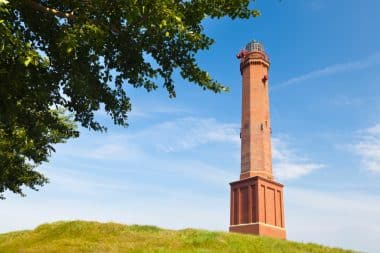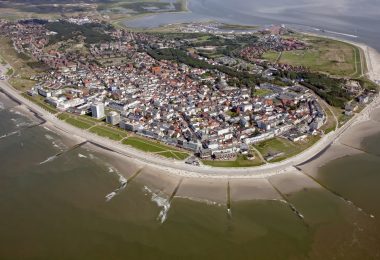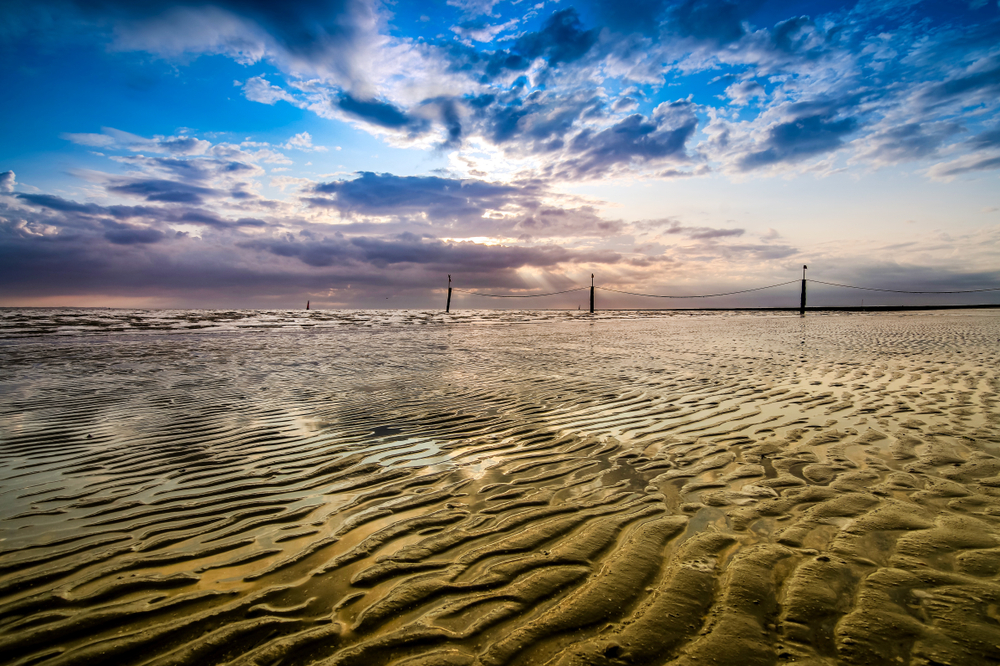Two kilometers wide, 14 kilometers long, 6,200 inhabitants, 330,000 tourists every year, 2,200 beach chairs! These are the bare figures of the North Sea island of Norderney. But behind it lies an island with a lot of charm and even more tradition. “Norder neye Oog” – that was the original name of this spot on the Frisian doorstep. Which can be translated as “Norden’s new island”. If you head for Norderney as a holidaymaker, you usually use a ferry from Norddeich-Mole. Unless you prefer the transfer with one of the small planes stationed at Norderney Airport. And at the latest when the guests feel the wind constantly blowing over the white dunes, they have arrived on Norderney. In Germany’s first North Sea spa.
Part of the UNESCO World Heritage Site

Norderney – The summer residence of the high nobility
Norderney has always been the destination of celebrities and received the title of a “North Sea spa” as early as 1797. For the royal Hanoverian nobility, the island became a popular summer residence in the early years of the 19th century, and those who wanted to afford something special on holiday on the nearby North German mainland followed the crowned heads and the captains of industry and enjoyed the spicy and invigorating air of this island as well as the flair of the former island village for some time. where the inhabitants were primarily engaged in fishing. Norderney gained importance with the Congress of Vienna in 1815, when East Frisia was added to the Kingdom of Hanover . From then on, many things changed on the island.
Accommodations on Norderney
Hotels for the upscale
Norderney is known for its high-quality hotels that offer luxury and first-class service. These hotels are often located in historic buildings and offer stunning views of the Wadden Sea or the North Sea. Here, guests can relax in luxurious rooms and suites, enjoy excellent restaurants and use the spa to pamper themselves.
Holiday apartments and holiday homes for flexibility
For travelers who want more independence, a holiday home or apartment on Norderney is a great option. Accommodating families and groups, these accommodations are equipped with fully equipped kitchens to accommodate self-catering. From cosy beach huts to spacious villas, there is a holiday apartment to suit every need and taste.
Camping and motorhome pitches for nature lovers
For those who are looking for closeness to nature, there are also campsites and motorhome pitches on Norderney. Here you can camp in the open air and enjoy the fresh North Sea air. Most campsites offer modern facilities such as sanitary buildings and electricity connections.
Norderney – In the footsteps of prominent guests
From then on, writers such as Theodor Fontane and Heinrich Heine, politicians such as Gustav Stresemann and Otto von Bismarck regularly met on Norderney during the warm summer months. Emperor Wilhelm I was even erected a monument on Bismarckstraße. For this purpose, 75 rock blocks from all parts of the former German Empire were piled up. And anyone strolling through the pretty village with its historic buildings today will get a vague impression of why the celebrities of days gone by enjoyed the summer retreat on Norderney with all their senses. The Kurhaus from 1836, where a casino is located today, has been preserved. And the “Royal Lodging House” with its classicist façade, which has since been converted into a hotel.
The sophisticated character is still present

With the tourist train to the old mill
Bömmel’s tourist train is still a relic from an old time. It chauffeurs its guests from the rose garden to the mill, passing a picturesque dune landscape and the marina. The most striking building on the island is the lighthouse with its 54 meters height. If you are good on foot, climb 254 steps to the viewing platform and get an impressive panoramic view. The neighbours Juist, Borkum, Langeoog and Spiekeroog can be seen without binoculars. The windmill and the stone beacon, which served as a guide for sailors for generations, are also listed as historical monuments. The post office and the Conservation House, where the information centre is housed and which sees itself as the cultural centre of the island, date back to imperial times. Hikes through the Wadden Sea are still a highlight for guests who book their holiday home on Norderney year after year. An attraction for music enthusiasts is the annual “Summertime” event, where stars from pop, rock and classical music meet.


